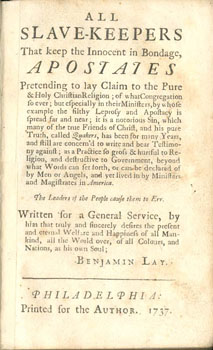Benjamin Franklin And Slavery
|
| updated |
Copy Link Code
|
 For most of Benjamin Franklin's life, he held beliefs on the inferiority of Africans that were in line with the predominant views of contemporary Americans. His legacy on the matter of slavery, however, would demonstrate a drastic change in character. In the last decade of his life, Franklin would join and eventually lead an abolitionist group based in Philadelphia called the Society for Promoting the Abolition of Slavery and the Relief of Negroes Unlawfully Held in Bondage. He freed his own two slaves, George and King, and hoped in vain that other Founding Fathers would follow his lead. Franklin understood that the liberty and equality preached by the leaders of the nation was but a fallacy if they did not remove the system of slavery. It should be recognized that abolitionism was a tiny movement at the time and that Franklin was putting his reputation on the line, but his commitment was unwavering and he made it the last and greatest issue of his public life.
For most of Benjamin Franklin's life, he held beliefs on the inferiority of Africans that were in line with the predominant views of contemporary Americans. His legacy on the matter of slavery, however, would demonstrate a drastic change in character. In the last decade of his life, Franklin would join and eventually lead an abolitionist group based in Philadelphia called the Society for Promoting the Abolition of Slavery and the Relief of Negroes Unlawfully Held in Bondage. He freed his own two slaves, George and King, and hoped in vain that other Founding Fathers would follow his lead. Franklin understood that the liberty and equality preached by the leaders of the nation was but a fallacy if they did not remove the system of slavery. It should be recognized that abolitionism was a tiny movement at the time and that Franklin was putting his reputation on the line, but his commitment was unwavering and he made it the last and greatest issue of his public life.
The first sign of Benjamin Franklin's change of heart came in a letter after his experience visiting a school for African children in 1763. He wrote to an English friend that he had "conceived a higher opinion of the natural capacities of the black race, than I had ever before entertained. Their apprehension seems as quick, their memory as strong, and their docility in every respect equal to that of white children." With this adjustment, Franklin rejected the dominant racial theory of the time and actually came closer to the views most Americans hold today. During the build up to American Independence, Franklin was outspoken about the threat of slavery imposed upon all Americans by the British. When he visited Ireland in 1771, he was shocked at the poverty and depredation imposed by the oppressive laws of the British rulers; this experience frightened Franklin about the possibility of similar conditions occurring in the American colonies. Combined with his increasingly egalitarian views on race and fears of slavery, Franklin inched closer to promotion of outright rebellion and the birth of a new model nation.
It was in 1785, after his return from diplomatic duty in France, that Benjamin Franklin and slavery issues would come to the surface. He joined the aforementioned Society and signed their petition to the Pennsylvania State Legislature, announcing once and for all that he was an avowed abolitionist. In the view of Benjamin Franklin, slavery was a stain upon the nation and would only inhibit true liberty for future generations. Always the pragmatic man, Franklin was also concerned with the adjustment of enslaved African Americans to freedom. In his "Address to the Public", Franklin argued for the creation of schools and support groups designed to educate freed African Americans and facilitate their assimilation into a new, equal and industrious nation. For Benjamin Franklin, slaves were fully capable of becoming free, entrepreneurial Americans, but he understood that such an adjustment would require support from the nation that had taken away their freedom in the first place.
